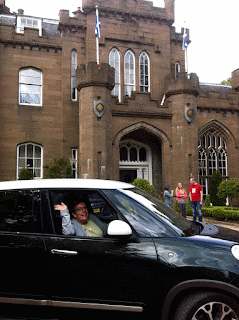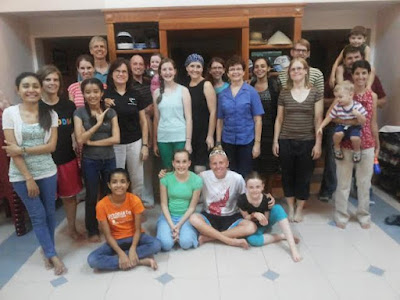In June, I had the immense privilege of attending the wedding of my Scottish friends Michaela and Neil. Michaela and I lived and taught together for five years in Phnom Penh, and I first met Neil when he visited her in Cambodia in fall 2013. In fall 2014, he moved there to join us on staff at Logos, but soon had to leave due to a stroke. So the last time I saw the two of them was last September at a hospital in Bangkok, where we shared a chuckle about gecko-flavored coffee, among other things.
This time around in Scotland was a much more joyous occasion and an incredible testament to their perseverance and God's healing power. I spent a week there, inseparable from my fellow North Americans and former/current Logos teachers, Lorissa and Susan.
Highlights included the lush green landscape, replete with early-summer blossoms, as well as two nights in the castle (!) where they were married, and a side trip at the end to the historic, charming city of Edinburgh. (Are you jealous yet?) I didn't get many souvenirs since I was in transit between Cambodia and the US with all my earthly possessions, but I did come away with some fun new lingo. Here are the words that stuck with me, illustrated with examples and photos from my trip. Confession: I'm guessing many of these words are also common across the UK and beyond, rather than being specifically Scottish, but they were new to me (besides #10) - even after five years as Michaela's housemate.
1. confetti (n.) - not just tiny bits of paper, but also dried flower petals, sometimes thrown at the bride and groom after the wedding ceremony.
Examples:
Michaela's mom Brenda persuaded her that offering tiny paper bags of confetti to guests would revive a sweet old tradition.
Brenda was delighted that Lorissa and I could help pluck flowers for the confetti, but in our minds it didn't exactly feel like work.
Amid the excitement on the morning of the wedding, the basket of confetti was left behind, but a few children still brought their own paper confetti to throw.
2. black pudding (n.) - a blood sausage made of congealed pig's blood and fat cooked with spices, onions, and lots of oats. It's often fried before serving.
Examples:
The "full Scottish breakfast" provided at our hotel included black pudding.
The waitress confirmed Lorissa's and my hunch of what black pudding was, but also encouraged us to try it, vowing it was delicious.
Lorissa and I ended up enjoying our black pudding and getting it on subsequent occasions, but Susan wasn't quite sold on it.
 |
| Our black pudding was topped with a tomato. The casing is inedible. |
3. hill walking (v.) - hiking in the hills or mountains.
Examples:
We visited Crathes Castle, near Michaela's house, where her mom often takes the dog hill walking through the grounds.
Scotland is a wonderful place for hill walking because there are no laws against trespassing; as long as you close gates behind you and pick up your litter, you're free to enter anyone's property.
We enjoyed some scenic hill walking near our hotel in Michaela's hometown.
 |
| Lorissa and me at Crathes Castle |
 |
| Trespassing has rarely been so scenic. |
4. Sat Nav (n.) - a Satellite Navigator, otherwise known as GPS.
Examples:
Lorissa, Susan, and I were too cheap to pay for a Sat Nav in our rental car, due to Scottish sticker shock, our unemployment, and a "can-do" attitude stemming from years in Cambodia.
A Sat Nav would have helped when we got lost on our way through the fog-shrouded hills of the Highlands en route to the wedding rehearsal.
Despite lacking a Sat Nav, we successfully found not only the wedding venue (Drumtochty Castle!) but also several other beautiful locations on our way from there to Edinburgh after the wedding.
 |
| Susan got a big kick out of our cute car and driving on the "wrong" side of the road. And hey, look, it's Brenda, Michaela, and Neil at Drumtochty Castle! |
 |
| The Coastal Highway from Glasgow to Edinburgh |
5. Order of Service (n.) - the program given to guests for the wedding.
Examples:
Lorissa and Susan folded papers and tied ribbons for the Order of Service while I practiced guitar at the wedding rehearsal.
The Order of Service featured some entrancing songs from the region, like the Celtic fiddle and flute duet "Crow Road Croft" (used in the processional) and Rend Collective's "Immeasurably More" (for the recessional).
6. Signing the register (n.) - the part of the wedding ceremony when the bride and groom make their marriage legal and official.
Examples:
When Michaela initially asked me to play guitar during the signing of the register, I thought she meant I'd play as guests signed a guest book when first arriving.
Since we weren't sure how long it would take to sign the register, I prepared an arrangement of "Praise to the Lord, the Almighty" and a classical song that I could divide into chunks to stop whenever they were finished.
It was a privilege to play as she and Neil signed the register, but I was relieved when it was over and I hadn't wrought havoc on their ceremony.
7. fascinator (n.) - a woman's decorative hairpiece, containing feathers, artificial flowers, lace, and/or ribbons, often worn at weddings.
Examples:
It used to be that every Scottish woman wore a hat to weddings, but now fascinators have become trendy.
Probably half the female guests wore fascinators - about the same as the proportion of male guests wearing kilts.
Michaela's aunt sported a bright pink fascinator to match her pink dress, and mused to me, "It just doesn't feel like a wedding without a hat or a fascinator."
Michaela's mom, Brenda, wore a fascinator...
(the men are Michaela's dad, Gerry, and Neil)
 |
| ... as did three guests pictured here. |
8. tablet (n.) - a sweet vanilla treat, similar to a square of fudge, often eaten with coffee or tea after a meal.
Examples:
The whole time we were in her hometown, Michaela's dad, Gerry, kept us on a sugar buzz with local treats like tablet.
At the reception, Lorissa and I couldn't resist having our tea and tablet the posh British way - pinkies out!
9. Tunnock's teacakes (n.) - a chocolatey, marshmallowy treat proudly made by a local company outside Glasgow.
Examples:
Neil and Michaela left sweet gifts for each of us in our room at the castle: Tunnock's teacakes, a thoughtful note, and a can of Irn-Bru (a very sweet Scottish soft drink known as "Scotland's other national drink").
Tunnock's teacakes are one of many fine Tunnock's products, including caramel logs and caramel wafer biscuits.
Michaela stumbled upon the brilliant idea of making a "Tunnock's tower" of treats for the ceilidh dance, which we had fun constructing.
 |
| Lorissa and Susan look inclined to sneak off with the tower, don't they? |
10. ceilidh (n.) - a traditional Gaelic social gathering featuring dances akin to a US square dance. Pronounced KAY-lee.
Examples:
Ceilidhs are common in Scotland and Ireland for social events such as birthdays, town festivals, and weddings.
I had previous ceilidh experience since I helped Michaela host two of them at Logos for her birthday and another housemate's birthday... perhaps the only two ceilidhs ever held in Cambodia.
I love ceilidh music - especially with a live band, like at the wedding!
I was amazed by Neil's ceilidh dancing performance with Michaela to kick off the evening - last time I saw him in September, he was learning to wiggle his left big toe.
The ceilidh dances required a bit of concentration but were pretty accessible even to beginners.
A "Gay Gordons" dance
~ ~ ~ ~ ~ ~ ~ ~ ~
Last fall I wrote Neil and Michaela a limerick on a paper gecko and put it into a teapot to send to them in Bangkok. (Long story - read it here.)
A gecko once traveled to Thailand,
Finding Neil and Michaela inside-land.
Celtic music was played
In their room every day:
Preparation for ceilidhs in the Highlands.
When I wrote it, I was hoping - but not sure - that they could still get married this summer in spite of his stroke. I wasn't sure he'd ever be able to ceilidh again, though I knew Michaela had always dreamed of hosting a ceilidh at her wedding. Seeing it with my own eyes, and dancing alongside them, and in the Highlands at that... it was truly a moving experience.




















